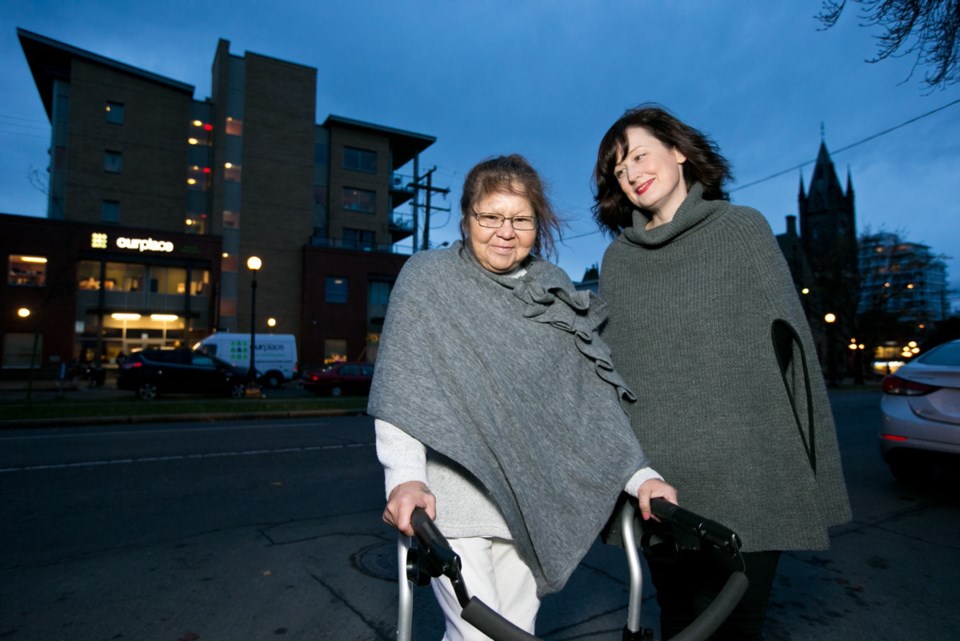While homelessness and addiction have been issues for years in Victoria, Us and Them, Krista Loughton’s feature documentary that addresses them, has been a long time coming.
It is 13 years since Loughton conceived the idea for her moving labour of love, which premièred at Victoria City Hall Thursday night.
“The film went through four different concepts by the time we settled. It just kept morphing,” said Loughton, whose project has taken on a life of its own since production began in 2006.
While making a film in fits and starts over several years is unconventional and challenging, the result is remarkable.
The trajectory of production of the film Loughton co-directed with Jennifer Abbott (The Corporation) is as fascinating as some of the onscreen stories they update as time passes.
What began as a partnership between Loughton and co-producer David Malysheff, its director of photography, who left the project after wrapping principal photography in 2009, was financed at one stage through a crowdfunding campaign. Abbott came on board as editor and story consultant, as did cinematographers Daniel Carruthers and Bill Weaver to shoot additional footage.
The result is an intimate journey into the lives of four members of Victoria’s street community, their candid stories putting the film’s social issues into sharp focus.
Us and Them doubles as a cathartic exploration of Loughton’s parallel healing journey. As Dawnellda Gauthier, an articulate recovering heroin addict, says to Loughton after she shares her own battle with depression: “You have your own hell and I have my own hell, and none is worse than the other. Hell is hell.”
Gauthier, a misunderstood 90-pound woman in her late 40s, suffered from night terrors, walked the streets at night, had her teeth knocked out and was prone to violent outbursts.
The film’s other subjects are Karen Montgrand, a middle-aged Métis woman with a dry sense of humour, whose horrifying childhood and family tragedy fuelled her alcoholism; Eddie Golko, a drug addict in his 40s who had a spiritual awakening after discovering Buddhism; and Stan Hunter, 60, a former heroin addict with charisma to spare, who used to panhandle outside Wellburn’s market.
It was Stan who inspired Loughton’s resolve to make her documentary as honest and respectful as possible, after he initially suggested she was part of “the homeless industry.”
“There’s a line between the homeless and everyone else. It’s us and them,” he said, inspiring the film’s title.
That two characters died during production magnifies the heartbreak, offset by hopefulness, in Loughton’s plea for compassion.
The film’s chief strength is how it transcends stereotypes, humanizing endearing characters while revealing their stories.
It also explores the causes of addiction with input from Vancouver author and addiction expert Dr. Gabor Maté; Phil Lane Jr., a hereditary chief who uses a sacred First Nations medicine wheel as a healing tool; and Rev. Al Tysick, the street minister who was Loughton’s tour guide in the streets in 2007, when he was executive director of Our Place.
It was during her 2010 interview with Maté that Loughton’s depression and the impact of her parents’ divorce when she was three surfaced, changing the story arc when he challenged her to confront her motives.
Feedback from Victoria-raised filmmaker Atom Egoyan prompted the film’s final tweak.
“Atom sent me notes and we changed the opening and first act based on what he said,” recalled Loughton, who, with Abbott, simplified the structure and pruned it to 81 minutes.
It followed “an editing diagnostic, where problems jumped out like pieces of popcorn,” she said.
How does Loughton feel now that Us and Them is in the can?
“I feel like 1,000 pounds have been lifted from my body,” said Loughton, whose excitement is bittersweet. “I wish there wasn’t a need for this film, but the sad reality is that there is.”
She learned a valuable production lesson making a film funded on the fly, in part with $20,000 from her mother’s line of credit.
“My next film will be funded first, before any cameras come out of the bag,” said Loughton with a laugh. She hopes to make a documentary about “the addicted brain.” Loughton credits sponsors such as Telus and community philanthropists Rob Reid, campaign chairman for leading sponsor Victoria Cool Aid Society’s Help End Homelessness campaign; developer Gerald Hartwig; Chemistry Consulting CEO Frank Bourree; and Peter Ciceri, the psychotherapist and former Custom House CEO, for supporting her through post-production.
Although Montgrand was happy to report “I’m doing good now,” she said she has mixed feelings about the film’s release.
“I’m happy, but in a way I feel like hiding under the bed or something,” said Montgrand, who will participate in a question-and-answer session moderated by Cool Aid Society’s Kathy Stinson after the film’s public screening at the Vic Theatre on Dec. 9 at 7 p.m.
A red-carpet screening for the street community will be held at 2 p.m. on Dec. 23, at First Metropolitan Church.
